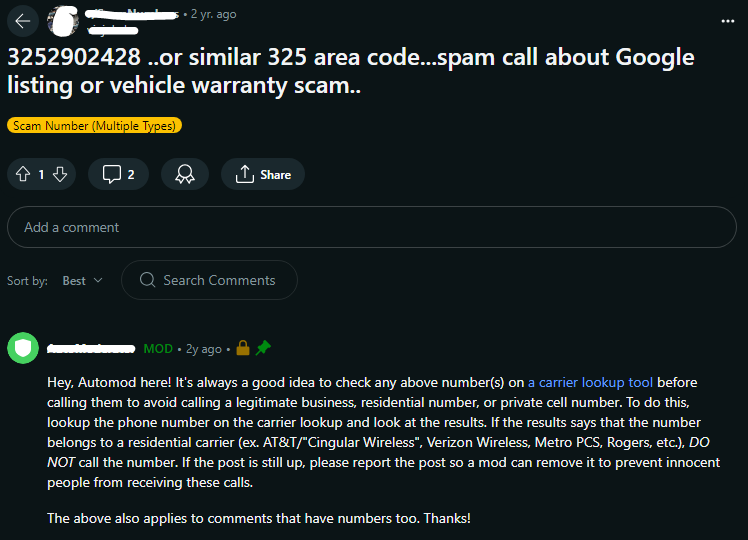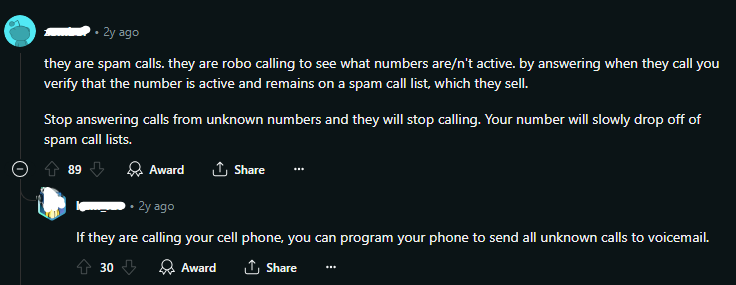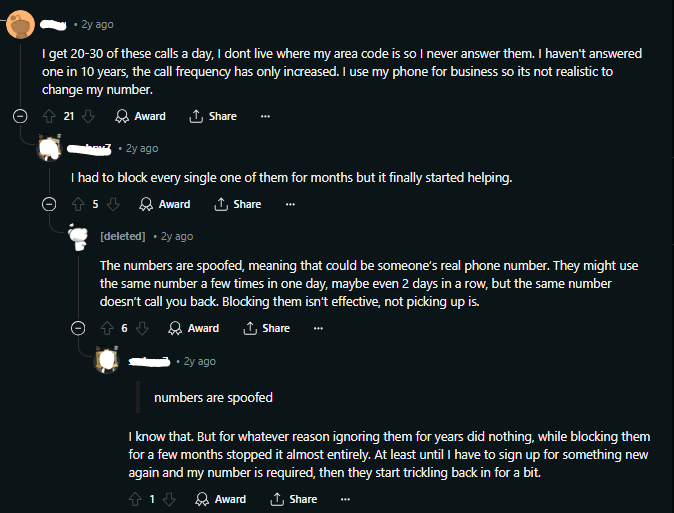Table of Content
- What is Area Code 325?
- Is the Area Code 325 Spam?
- What are Most Spam Calls from 325 About?
- How to Know if a Call with Area Code 325 is Spam?
- 7 Best Ways to Avoid Area Code 325 Scams
- What are the Most Common Numbers Used by the Scammers Having Area Code 325?
- Frequently Asked Questions (FAQs)
- Watch Out for Scam Calls!
Have you ever received a call from an unknown number just to hear a robotic voice telling you you owe the IRS millions?
You are not alone.
Scammers' methods continuously evolve, and it only takes a supposedly local area code to deceive you. Let's go into it and find out the facts regarding area code 325 frauds.
What is Area Code 325?
Area code 325 covers central Texas, including Abilene, San Angelo, and Brownwood, according to the North American Numbering Plan. It was developed in 2003 as a break from area code 915 to meet the region's growing need for telephone numbers.
Is the Area Code 325 Spam?
Area code 325 is not exclusively linked to spam. Spam calls can come from any area code, including 325, although the area code alone does not indicate if a call is spam or not.
Automated systems frequently make spam calls and can originate from various area codes, including spoofed numbers, to deceive recipients into answering.
It is critical to take precautions when receiving calls from unknown numbers and, if necessary, to utilize call-blocking tools or apps to reduce spam calls.
What are Most Spam Calls from 325 About?
Spam calls from area code 325, like unwanted calls from other area codes, can vary greatly in matter and purpose. They may contain frauds relating to:
- Fake IRS or Federal Agency Calls
Fraudsters may mimic government officials and say that your taxes are incorrect or that you owe the IRS money.
SAPD has gotten reports from citizens who have been asked over the phone by individuals claiming to be SAPD agents. Although the Caller ID displays a 325 area code, SAPD believes the calls are coming from outside the area.
- Financial Scams
may include fraudulent investment opportunities, loan or credit card offers, or demands for private financial data.
- Healthcare Scams
Scammers may act as agents from health insurance companies or medical organizations and provide fraudulent health treatments or products.
- Utility Scams
They may pose as personnel from utility providers, threatening to stop your service unless you pay immediately.
- Tech Support Scams
Callers claiming to be from well-known firms' tech support departments, such as Microsoft or Apple, deceive customers into allowing them access to their computers or paying for useless services.
- Prizing Scams
Scammers may pretend that you have won a prize or lottery but must pay a fee to claim it.
- Robocalls
are automated calls that play pre-recorded messages, generally marketing various products or goods and services, political campaigns, or spreading false information.

How to Know if a Call with Area Code 325 is Spam?
Consider the following factors when determining whether a call from area code 325 is spam:
- Unknown Caller ID
Check the caller ID to check whether it contains a familiar name or number. If the number is unfamiliar or displays "Unknown" or "Blocked," it may be a spam call.
- Immediate Action
Be suspicious of calls that create a sense of urgency or force you to act immediately, especially if they request personal or financial information or threaten damages if you fail to take action.
- Unauthorized Demand For Confidential Information
Legitimate firms rarely require sensitive information over a call, such as SSN, bank account information, or passwords. Be wary if the caller with area code 325 requests such details.
- Poor Voice Quality
Many spam calls from everywhere including area code 325 are automated and may have poor audio quality or a robotic voice.

- Verification
If you're unsure about the legitimacy of a call, request the caller's contact information and independently confirm it through legitimate means before providing any information or taking any action.
Why Do I Get Calls from the Same Number Having Area Code 325?
You should be vigilant if you keep getting calls from the same number with area code 325 and feel it's spam or a spoof. If the number is repeatedly strange, consider blocking it, and exercise caution when providing personal information over the phone.
You can also report the number to your phone provider or the Federal Trade Commission (FTC) to help prevent phone scams and fraud.
If you are receiving calls from the same number with area code 325, it could be due to numerous factors, including:
Automated calls or Telemarketing
Automated systems used for telemarketing or robocalls frequently run through a list of phone numbers, including those with area code 325, to reach potential customers. This could result in repeated calls from the same number.
Spoofing
Spoofing is when scammers use caller ID to present a fake number, which is usually local or known to the recipient. They may spoof the area code 325 to boost the chances of someone answering the phone.

Consistent Con Artists
Some fraudsters may contact recipients frequently using the same fake number to catch them off guard or wear them down, increasing their chances of falling for their scam.
7 Best Ways to Avoid Area Code 325 Scams
To avoid becoming a victim to scammers coming from area code 325 or any other area code, try the following techniques:
- Verify Caller Identity
If you receive a call from area code 325, check the caller's identification before providing any personal or financial information. Legitimate organizations, such as callback numbers or official websites, frequently include measures to prove their identification.
- Be Wary of Unexpected Calls
If you receive an unsolicited call from area code 325, especially if it seeks sensitive information or requires immediate action, be cautious. Avoid disclosing personal or financial information over the phone unless you initiated the conversation and trust the recipient.
- Use Caller ID and Call Blocking
Monitor incoming calls with caller ID, and consider utilizing call-blocking tools or applications to filter out known scam numbers. Many smartphones include built-in call-blocking technology, or you can download third-party apps that filter spam calls.
- Educate Yourself
Learn about common phone scams and the strategies used by scammers. Understanding typical scams might help you identify warning signs and avoid falling prey to fraudulent schemes.
U.S. Customs and Border Protection staff continue to receive calls from people who are worried about unsolicited calls from scammers posing as Border Patrol agents and officers.
"We are receiving an increase in phone calls from concerned citizens regarding scammers posing as CBP employees seeking information about suspected illegal activity," said CBP Houston Director of Field Operations Jud Murdock. He continues:
“If CBP suspects illegal activity, we will not call a suspect or a victim requesting money or social security numbers. To be clear, CBP will not make telephone calls threatening citizens that law enforcement is on the way or promising money for information.
Anyone receiving a call from U.S. Customs and Border Protection about a shipment of drugs or money should recognize that it is a scam regardless of how authentic the caller may sound.”
- Report Weird Calls
If you receive a strange call from area code 325 or any other area code, notify the Federal Trade Commission (FTC), or other appropriate authorities. Reporting scams helps police in tracking fraudulent callers.
- Stay Updated with Scam Patterns
Scammers often modify tactics and devise new plans to target victims. Stay informed about current scam trends and share information with friends and family to assist others avoid falling victim to scammers originating in area code 325 or elsewhere.
- PurePrivacy Secures Your Identity from Scammers
PurePrivacy protects your personal information by encrypting your internet traffic and hiding your IP address.
Using encryption and identity theft prevention approaches, PurePrivacy helps you reduce the risk of falling victim to numerous online risks, such as fraud and unlawful activity.
What are the Most Common Numbers Used by the Scammers Having Area Code 325?
Certain numbers are frequently reported among the uncountable spam calls coming from the 325 area code. The following is a list of the most often reported 325 numbers.
- 3252376879
- 3254255086
- 3252890635
- 3257489090
- 3252447821
- 3259995598
- 3258963103
- 3258840199
- 3258760113
- 3258675170
Frequently Asked Questions (FAQs)
-
Why should I be cautious of a call from the 325 area code?

While not all 325 calls are fraudulent, statistics suggest it is one of the most commonly reported spam call origins in various states, particularly South Dakota and Texas.
-
Are there any valid reasons I might receive a call from the 325 area code?

Yes, of course. The 325 area code applies to companies and persons in Texas and South Dakota. You could receive calls from:
You interacted with a local company.
A friend or family member's phone number in the 325 area code.
A legitimate political campaign. -
What should I do if I unintentionally answer a scam call?

Do not disclose personal information: No matter how persuasive the caller sounds, do not give them your Social Security number, bank account information, or any other sensitive information.
Hang up immediately: Don't interact with the caller. Don't hit any buttons or answer "yes" because this could lead to you signing up for undesirable services.
Report the Scam: Report the call to the FTC using the website provided previously.
Watch Out for Scam Calls!
Staying educated about scammers' strategies and following the safety precautions suggested above may significantly reduce your risk of being a victim of 325 area code scams.
Remember that scammers are continually improving their tactics, so it's essential to remain attentive and wary of unsolicited calls. If you suspect a scam, do not hesitate to hang up, report it, and teach others how to protect themselves.





